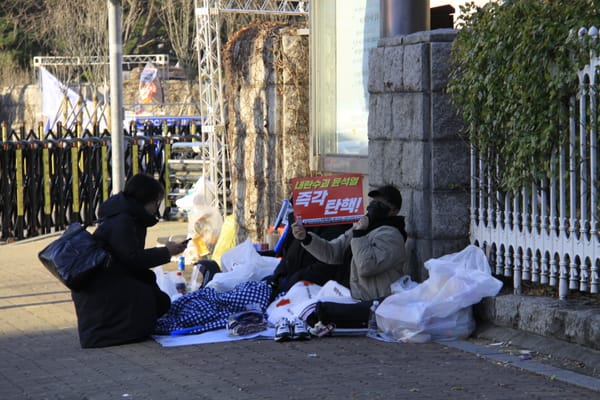Asia Undercovered Round-up: 19 February 2025

This week in Asia Undercovered: Death row inmate Pannir Selvam Pranthaman's case in Sinapore, hypocrisy of military involvement in forest management, Tamil media blocked by the Indian government for publishing satire cartoon, access denied to Bangladesh's state violence sites, reportage from the Sanakham Dam in Thai-Lao border, and my latest story on South Korean protest culture.
Pannir Selvam Pranthaman's case in Singpoare
Pannir Selvam Pranthaman, a Malaysian national, was arrested on 3 September 2014 at Singapore's Woodlands Checkpoint for trafficking 51.84 grams of heroin. Despite acknowledging his role as a courier, he was sentenced to the mandatory death penalty in 2017. His appeals and clemency petitions were subsequently denied.
In February 2025, Pannir Selvam Pranthaman's family in Kuala Lumpur received a sudden notification that his execution was scheduled for February 20, providing them only four days' notice. This abrupt announcement came just a day after they had visited him in Singapore, with no prior indication of the impending execution. The brevity and insensitivity of this notice exemplify the bureaucratic cruelty inherent in the capital punishment system.
Historically, death row inmates in Singapore were granted a seven-day notice before execution. However, in June 2024, the Ministry of Home Affairs revised this protocol. According to a Court of Appeal judgment from October 2024, if an inmate had previously received an execution notice and it was stayed or halted beyond the halfway mark of the notification period, the subsequent notice period could be reduced. This policy change means that individuals like Pannir, who have been on death row for extended periods, may receive even shorter notices for their rescheduled executions.
Hypocrisy of military involvement in forest management
Mongabay reported growing concerns on militarized crackdown on illegal forest use. In January 2025, Indonesian President Prabowo Subianto issued a regulation deploying the military to lead efforts against illegal activities in the nation's forests, such as unauthorized oil palm cultivation and mining. This initiative aims to reclaim approximately 3.37 million hectares of forest land currently occupied by illicit oil palm plantations contributing significantly to Indonesia's palm oil production. The Ministry of Forestry has partnered with the military to protect and rehabilitate these forest areas.
However, activists express concern that this militarized approach may disproportionately impact Indigenous and local communities. Historically, enforcement actions have targeted small farmers and Indigenous groups cultivating modest plots, while large-scale corporate plantations often evade scrutiny. The new regulation does not differentiate between extensive corporate operations and the subsistence activities of local communities, potentially criminalizing those who have long-standing ties to these lands predating Indonesia's independence in 1945. The lack of legal recognition for Indigenous land rights exacerbates their vulnerability to forced displacement.
Indonesia has a history of military involvement in forest management under the Suharto regime which eventually devastated the forest and wildlife ecosystem. The authoritarian military government of Suharto relocated indigenous communities of forest land and cleared primeval forests for mining and oil palm plantation in Papua. Instead of finding justice to past human rights and destruction of forests, President Prabowo issued a new regulation that is a legal license to the Indonesian military to continue doing what they have been doing from this tragic legacy.
Nearly a 100-year old Tamil Media blocked by Indian government
One of Tamil Nadu’s oldest media houses Vikatan has alleged its website was “blocked by the central government” after it published a cartoon on Indians being handcuffed during their deportation from the United States.
The media house’s statement said there has been “no official announcement from the central government regarding the blocking of the Vikatan website”.
“For nearly a century, Vikatan has stood firmly in support of freedom of expression. We have always operated with the principle of upholding free speech and will continue to do so. We are still trying to ascertain the reasons behind the blocking of our website, and are in the process of taking up this matter with the ministry,” the statement said.
Access blocked to Bangladesh’s state violence sites
A long-anticipated public inspection of Bangladesh’s secret detention centres, including the notorious Joint Interrogation Cell (JIC, Aynaghar) and the Taskforce for Interrogation (TFI), has ground to a halt under pressure from the military, Bangladesh media Netra News reported.
Families of victims and human rights activists have for months demanded an independent review of the detention sites, which include facilities run by the Directorate General of Forces Intelligence (DGFI) and Rapid Action Battalion (RAB). Many of these sites have existed outside the purview of public scrutiny for years, as the ousted Sheikh Hasina government routinely used them to secretly detain people, including political prisoners, while denying ever doing so.
The Joint Interrogation Cell (JIC), formerly a military-run interrogation facility, was converted into a secret detention centre, Aynaghar, whose existence Netra News first reported in 2021. Another infamous site is the Taskforce for Interrogation (TFI), located in Uttara, which was run by the RAB, an elite police unit under effective military control.
Reportage from the Sanakham Dam in Thai-Lao border
The Sanakham Dam, a 684-megawatt hydroelectric project planned by the Lao government, is set to be constructed just 2 kilometers from the Thai border near Chiang Khan District, Loei Province. Estimated at $2.07 billion, this dam is the sixth proposed on the lower Mekong River by Laos, with two already operational and a third, the Luang Prabang Dam, under construction.
Local communities in Thailand express deep concerns over the dam's potential impacts, reported the Diplomat. Thanusilp Inda, head of Ban Klang village in Chiang Khan, fears ecological damage, fish population declines, and increased flooding. The Thai Human Rights Commission (THRC) has advised the government to delay the project until thorough assessments of transboundary effects on Thai livelihoods are conducted. Potential adverse effects include flooding, riverbank erosion, and harm to significant tourist sites like Kaeng Khut Khu in Chiang Khan District and Phan Khot Saen in Nong Khai Province.
Despite opposition, the Thai government's Office of the National Water Resources (ONWR) proceeded with the Mekong River Commission's consultation process. During a recent forum, NGOs and civil society groups clashed with officials over the dam's potential impacts. Professor Kanokwan Manorom from Ubon Ratchathani University highlighted severe concerns regarding hydrology, ecology, society, economy, culture, and livelihoods, noting that approximately 70,000 people across 115 villages could be affected. Activists argue that lessons from existing dams, such as the Xayaburi Dam, which has already disrupted local fisheries and caused erratic water fluctuations, should inform decisions on new projects.
My latest story to answer why are South Korean protests so cheerful?
The profile story "Making Protests Fun" from Mekong Review explores the role of creativity and humor in political activism. It discusses how ordinary people employ imaginative methods to counter political absurdities and engage the public. The story highlights the use of popular culture to transform protests into engaging and impactful events. By infusing fun into demonstrations, people could capture attention to social and political agenda, foster solidarity, and challenge oppressive systems. Hope you enjoy reading this because I did so while interviewing and writing. 😄
Asia Undercovered: Round-ups and in-depth analysis of the news, events, trends and people changing Asia, but not getting enough attention in the US media. Curated by journalist Seulki Lee.
If you liked or found anyway interesting and meaningful reading this newsletter, you could buy me a cup of coffee or two to fuel me for next round-up on every other Wednesday.
Thank you for your support!


